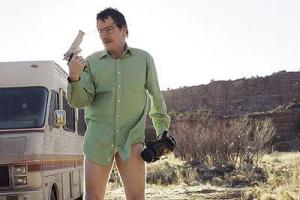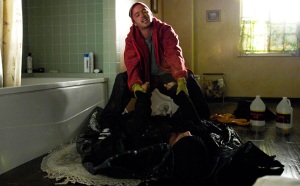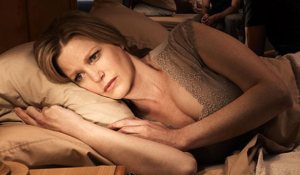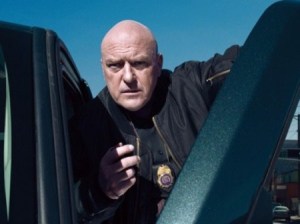
Mr Carson (Jim Carter) and Mrs Hughes (Phyllis Logan) in final shots of the season
Shot of older man’s bare feet in water
Mrs Hughes: ‘Come on, I dare ya.’
Mr Carson: ‘If I get my trousers wet … ‘
She: ‘If you get them wet, we’ll dry them …’
He: ‘Suppose I get them wet …’
She: “Suppose a bomb goes off, suppose you get hit by a falling star — you can hold my hand then we’ll go in together …’
He: ‘I think I will hold your hand, it’ll make me feel a bit steady … ‘
She: ‘You can always hold my hand if you need to feel steady …’
He: ‘I don’t know how but you manage to make that sound a little risqué …’
Hands held out, and grasping. She laughs good-naturedly …
She: ‘And if it did, we’re getting on Mr Carson, you and I, we can afford to live a little …
Medium-length shots of them going wading in together from the back …

Lady Edith (Laura Carmichael) let know by Tim Drew [Andrew Scarborough] he knews who’s this little girl is and will take full responsibility for the needed lies:
Drew: ‘I tell you what I think? It should be our secret, milady, our secret ours and no one else’s. I’ll … uh… send a letter to myself and tell Margie [his wife] it’s from an old friend of mine that’s died who asked for me to take the child. She won’t question it; then nobody but you and I will know … ‘
Edith: Mr Drew, would you do that for me …’
He: ‘For you and the little girl milady yes …
She: ‘How comforting it is that there are a few good people left in the world’ –
Dear friends and readers,
Of the four codas thus far this was the weakest yet had the most beautiful moments and witty dialogues. I too thought of the marvelous song, “By the sea, by the sea, by the beautiful sea, you and I, you and I oh how happy we’ll be …” and felt the Granthams really ought to get themselves more than one tenant as they have done so well in choosing this nobly hard-working one.
The weaknesses are serious. The central idea of the episode was to make us rejoice in Lady Rose MacClare (Lily James’s) debut in society, her presentation to the king, queen, prince, whose Edmund Burke-like meaning enunciated by none other than our most faithful liberal, Isobel Crawley (Penelope Wilton):
‘It came to me that these balls and presentations and comings out are not aristocratic folderol, but the traditions by which members of this family mark their progress through life … ‘
Thus that Rose carries on being unbelievable in her child-like behavior, depicted shallowly when she is told something real about life — as when her friend, Madeleine Allsop (Poppy Drayton) hints to Rose that Madeleine’s father, Lord Aysgarth (James Fox) is a debauched roué on the scent for money — and she giggles, astonished someone could be this way, just doesn’t cut it for the needed gravitas.
Except when for a short time Cora, Lady Grantham (Elizabeth McGovern) showed depth of feeling as a mother, grieved bitterly over her daughter’s death (and rightly) implicated her husband as at major fault, this second key character reveals a Fellowes’s lack of engagement with her. She really shows an astonishing lack of curiosity or insight into Edith’s long disappearance. It’s not believable — Fellowes can’t be bothered because making her understood would involved a deeply conflicted story. Cora has also shown no anger when her self-proclaimed “monarchist” husband lost all her money; this way Fellowes could have her do nothing herself about it: had it not been for that money, the Abbey would have been lost decades ago; mis-invested since by this same husband in railways, it was Matthew’s unexpected inheritance from Lavinia’s father (which we are reminded of in this finale) which has kept the building as shelter for a luxurious leisured way of life for the Crawleys. None of which Cora appears to register.
Fellowes wants us to believe her effective; her realm is making parties (luncheons, charity picnics, balls) so structurally necessary for the mini-series; no wonder everyone over-congratulates her upon these — But without the really able Mrs Hughes and Mrs Patmore (Lesley Nicol) Cora would not succeed at all — and in this episode we are shown that the real strength Cora depends upon is the unacknowledged Daisy (Sophie McShea), the power and great cook enabling Mrs Patmore, who, as she tells her fleeting suitor, Mr Levinson’s valet, Ethan Slade (Michael Benz) is “never excited.”
Robert, Lord Grantham (Hugh Bonneville) is not much better. He really believes Bates (Brendon Coyle) when Bates says he has (implied) another man ready to forge what’s needed. He somewhat hysterically blames the Crawley family for a near scandal involving the Prince of Wales, and stage-manages an ill-thought out attempt to steal back a love letter from Sampson by gaining access to Sampson’s room and ransacking it. As Bates tells ‘milord,’ if he were to have a precious document, he would not leave it about, but keep it close to him on his person, say his overcoat. We know Bates did just that with his train ticket to London, though why he kept it in the overcoat one minute longer than he needed to is a mystery of the same type as why Lady Grantham does not see immediately that Edith is going to Switzerland where ‘there are good hospitals’ to have a baby. Grantham also never suspects Edith, no matter how guiltily she talks in front of him (“Just remember I would never do anything to hurt you”).
As benignity is the tune that Lady Grantham’s effectiveness plays, so it is Lord Grantham’s tune, but that need not preclude giving them some cunning. Fellowes is again not engaging deeply enough with his character. The initial mistake was not to show that a lord of such a minor would be necessarily be a local politician to some extent, his house kept up as a linchpin of county networking — as are all Trollope’s comparable figures no matter how asocial they might be by nature (a number are) and Fellowes knows his Trollope novels very well. The ironic telling reason for their hollowness is Fellowes wants to justify such people: the “toffs” are not, as Lady Mary (Michelle Dockery) tells Blake (Julian Overden), the villains of the world.
Fellowes’s way of convincing us of this is to make them seem powerless.
And pace Edith’s words to Drew, this coda of a fourth season has a preponderance of good people left in the world: I counted three bad: Mr Green (Nigel Harman), rapist willing to strike again (not to worry, done away with); Thomas Barrow (Rob James-Collier) whose spite, bitter resentment, bad-mouth snitching hardly has an objective correlative in his supposed insecurity; Terence Sampson (Patrick Alexander) who in this episode adds theft and intended blackmail to his card-cheating abilities.
Also number of weak or ill-advised, most notably in this episode, Lord Aysgarth (James Fox) trying to marry Mrs Levinson (Shirley MacLaine) as an exchange of money and title; Jimmy Kent (Ed Speleers) a kind of minor devil version of Barrow (“Thank you, Wat Tyler” says Mr Carson to him at one point); the Prince of Wales (Edward VIII) played by Oliver Dimsdale as far feebler than he was

Grinning when he thinks of Rose’s father, “Shrimpy” (stuck in the heat of India, another helpless aristocrat)
Then there’s that bad-advice giver, Lady Rosamund Painswick (Samantha Bond) who pressures Edith to give up her baby but clearly loves her (has spent months with her on the continent, watching her give birth, breast-feed her baby, wean it) and thinks she has done what’s best for all:

Rosamund appealing emotionally to her niece:
‘This is for the best if you’ll only keep silent; there’ll be other loves other children. Don’t cheat yourself of that I beg you … [you think] I don’t know then, trust me because I do …’
What saves the coda — and the series too — is the actual writing, the concision and suggestiveness of all the dialogues (which I quote from liberally here to demonstrate) and that all the rest of the characters are seen in depth, are well-meaning, reach out to one another, are not self-reliantly effective (win out) while in pain themselves.
To be “kind,” Miss Baxter (Raquel Cassidy) informs Barrow Mr Molseley (Kevin Doyle) is to have “the advantage.” The series of scenes where the sensitive and intelligent Molseley protects Miss Baxter from Thomas includes this from Molslely:
I don’t know what Mr Barrow’s got over you and I don’t want to know; but you must’t let him do things that aren’t right, and you can’t let him bully you. That’s easy to say I know but if he draws you into his scehemes, that’s not going to be easy for you either. Sometimes it’s better to take a risk than go down the wrong path, that’s all
He’s already told her to trust to the views others are gaining of her: though viewer knows that Mrs Hughes is onto Miss Baxter’s over alert presence, Miss Baxter has betrayed no one. In their final moments as Molseley replaces Barrow by her side:
her words are:
Miss B: ‘I have to thank you, Mr Molseley.
Mr M: ‘Oh why’s that?”
She: ‘There are things in my past that made me afraid, but I’m not afraid any more. I’m not sure what will happen, but whatever it is, it’s better than being afraid. You’ve made m strong. Mr Molsley. Your strength has made me strong
He: ‘My what?’
She smiles
The parallel is to Edith who now has things in her past but by the end of the season is learning not to be afraid. Allen Leech as Tom Bransom almost retrieves his character. He is one of several characters who declare they are not ball-going, dancing types and declare at first they will not go to Lady Grantham’s ball after Rose’s presentation.
Tom is still exhibiting awkwardness and lack of confidence and self-esteem he has shown throughout this season, not least when he shows it’s the affection these people have shown to him that he has lapped up (of the museum-like library he says: ‘No it’s nice when everyone’s here and the fire’s going …’), especially with the schoolteacher, Miss Bunting (Daisy Lewis) whom he likes, partly because she is as wry and disillusioned as he once professed himself (He to Lord Grantham: ‘We all live in a harsh world, but at least I know I do’): high on the balcony looking at the engraved designs for the family, she asks where Cora’s is and if it’s a dollar sign.
But like Molseley, he gives in and comes to London, even goes to the ball, and at the right moment he turns to a woman near him who he knows is herself in need of support and encourages Edith (the episode began with them walking and talking together). Edith has watched him dance with Lady Violet, the Dowager (Maggie Smith) after the Dowager had finally told him ‘These are your people; this is your family now,’ and he had said, ‘This may be my family, but not quite my people, and asked her to dance.
Edith to Tom: ‘So did you enjoy it after all …
Tom: I enjoyed it fine, but we need to stand up to them, you and I. We may love them, but if we don’t fight our corner, they’ll roll us out flat
Edith: ‘You’re right, thank you for that …’
Edith then marches off to tell her obtuse mother she needs to take a trip to the continent, and her Aunt Rosamund that Rosamund cannot go for her. She brings her baby home. (One wonders if Tom knows …)
So in this coda the patriarchy is alive and sufficiently well that even less than respected strong males give important support and delight to strong but dependentconventional females. The scenes between Isobel Crawley and Lord Merton (Douglas Reith) who is continually after Isobel to come to the ball, and when last seen is dancing with her are touching. He is bringing her out of her widowhood as surely as Rhett Butler once did Scarlett O’Hara:
Daisy refuses the indirect marriage proposal of Mr Levinson’s valet (he disguises it through persuading his boss to hire the English cook whose food has shattered Mr Levinson’s assumptions that all English cooking is inedible, but as she tells Mrs Patmore, ‘I’m that chuffed it’ll take me through to next summer,’ and for once is not jealous of Ivy but glad to see Ivy have her chance by asking if she might replace Daisy and go to America.
A mother-daughter pair will return for another season …
The most interesting of these alert complex males are Mr Bates and Mr Levinson — Paul Giamatti is magnificent as the uneasy uncomfortable Mr Levinson attracted to Aysgarth’s daughter. Their several gradually less awkward dialogues where she takes as an insult his open frank (meant to be American) cynicism about her and his motives are worth some study showing Fellowes’s subtlety when engaged with his characters and issues their clash of personalities bring out. This is a pair I hope is brought back next season as she has told him she will demand a commitment the kind of girl he has hitherto taken aboard his yacht did not:
In an interview after the airing of this London season, Fellowes offered some insight into why Bates rivets us to the end:
So many women have had to conceal things that have happened to them, because if they reveal them, they went down, too. It was very important that it should be completely clear that it is not the victim’s fault at all. This was a chance to make the argument for the innocent rape victim who has done nothing to deserve it. And Anna, as either the most sympathetic character or certainly one of them, the audience could immediately grasp, she had done nothing to deserve to this. There is no sharing of guilt, no blurring of the edges of responsibility. Also, it created this mammoth thing that she and Bates had to get through, and Bates’s response is that he doesn’t love her less. He says himself, if anything he loves her more. What it has of course awakened is the kraken of rage in his belly.
Yes that’s it – and we’ve seen that deep rage against the order of the world, its injustices peep out here and there all along with evidence of sudden outbreaks over the “years” the show covers, from the time he invited Lord Crowborough (Charlie Fox) to search his drawers and room (Season 1, Episode 1), threatened Thomas at the throat (Episode 2) onto the clever doing away of Vera (Maria Doyle Kennedy), manipulating her reputation for spite into an apparent act of suicide, and his survival in prison. It’s he whose skill in forgery and pickpocketing saves the Prince of Wales (who of course thanks the wrong set of people as they run the ball). Bates knows part of his survival and thriving depends on his not being thanked — on his taking no credit. When his rage is stilled, he lives with what the world has allowed him:
And in Downton Abbey terms, it’s not a little. Anna has been our real heroine for four years now, from the time she took a hot meal up to Mr Bates when he was about to be fired because too many of the other servants and the Crawleys could not flex for a disabled man, to when she married and bedded him in one quiet day and night to now when she is determined to protect him more than herself from all that Mr Green could do or cause to happen.
Lady Mary (Michelle Dockery) is a cold performer in comparison. ‘Let the battle commence’ is the way once she learns that he is an aristocrat like she, she invites one of her men, Charles Blake (Julian Ovenden)] to woo her and win her over another, Lord Gillingham (Tom Cullen), a childhood sweetheart. Her ‘destiny’ is to save Downton Abbey for little George. Oh spare me.
I admit to being unable to see any act of hers as magnanimous (as I gather we are supposed to see her burning Bates’s London ticket that Mrs Hughes gives up to her); Blake’s first view of her is the more accurate: too privileged to understand her vulnerable humanity. Matthew never taught her that lesson either.
The real question of that scene for me is why did Mrs Hughes give Lady Mary a chance to turn Bates in, as she, Mrs Hughes, has said all along he did the right thing. Fellowes leaves ambiguous whether Bates did murder Green; after all, as Mrs Hughes says to Lady Mary, we have no idea where Bates went when he was in London. I suggest Mrs Hughes’s ambivalent behavior was Fellowes’s way of making his program look law-abiding, respectful of civilized methods. In both Anna and Mr Bates’s story we have one of Downton Abbey’s serious forays — as is Sybil’s death in childbirth — into sexual experiences in life for real.
I have not done justice to the sets or photography of places — which as in the codas of the other seasons had some interest.

The picnic by the Victoria and Albert Monument cost them a pretty penny
Nor some of the wry dialogues between Mrs Levinson (Shirley Maclaine) and the Dowager (who can put the other down more), the Dowager’s self-reflexive comments on the hour (she has “spent the evening in a who-dun-it”) or between Mrs Levinson and Lords Aysgarth as she dismisses his hunt for money through her — he seems never to realize that when she dies, it will go to her son. One of the best was that between Violet and Isobel setting off for London:
Duchess: ‘I know I’m late, but it couldn’t be helped. Cora insisted I come without a maid. I can’t believe she understood the implications
Mrs Crawley: ‘Well and they are? …’
Duchess: ‘How do we get a guard to take my luggage and when we get to London? What happens then?’
Mrs C: ‘Fear not. I’ve never traveled with a maid you can share my knowledge of the jungle.’
Duchess: ‘Can’t you even offer help without sounding like a trumpeter on the peak of the moral high ground?
Mrs C: ‘And must you always sound like the sister of Marie Antoinette?’
Duchess: ‘The queen of Naples was a stalwart figure. I take it as a compliment.’
Mrs C: ‘You take everything as a compliment.’
Duchess: ‘I advise you to do the same it saves many an awkward moment’
What I enjoyed most were the home-scape scenes (so to speak), the characters who were given depth and in numbers of their scenes, the beauty of integrity, which brings me back to the close and Mrs Hughes who for another season played the role of the insightful woman quietly working to achieve a sensible compromise.

Mrs Hughes pinning up a postcard picture of the beach alongside Mr Carson’s other materials on the servants’ bulletin board
I have not really explained why I forgive this mini-series so much — next time, when I write of Rebecca Mead’s My Life in Middlemarch.
Ellen
























































































